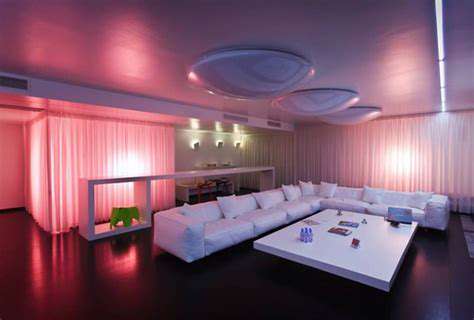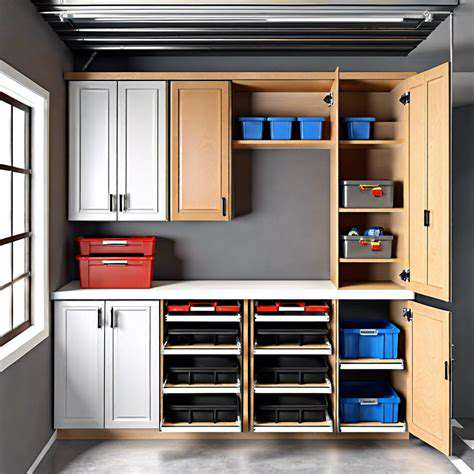Expert Secrets for a Modern Bedroom That Supports Better Sleep
Light Control for Better Sleep
Controlling the amount and type of light in your bedroom is crucial for regulating your body's natural sleep-wake cycle, also known as the circadian rhythm. Exposure to bright light, especially in the hours leading up to bedtime, can suppress melatonin production, the hormone that promotes sleepiness. Aim to dim the lights several hours before you plan to sleep. Consider using blackout curtains or shades to block out streetlights and other external light sources. Even a small amount of light can interfere with sleep, so be mindful of the light emitted from electronic devices like phones and tablets, as well as bedside lamps. Replacing these with softer, warmer light sources can greatly improve sleep quality.
Utilizing a sleep mask can also be a beneficial tool for blocking out light. This simple accessory can create a more conducive environment for falling asleep and staying asleep throughout the night. By minimizing light interference, you can promote a more restful and rejuvenating sleep experience.
Sound Control for a Peaceful Night's Rest
Noise pollution can significantly disrupt sleep. Whether it's the sound of traffic, barking dogs, or snoring partners, unwanted noise can make it difficult to fall asleep and stay asleep. Creating a quiet sleep environment is essential for optimal sleep quality. Consider using earplugs, white noise machines, or sound-masking devices to block out disruptive sounds. These tools can help to create a more serene and peaceful atmosphere, promoting deeper and more restorative sleep.
Temperature Regulation for Sleep Success
Maintaining a comfortable room temperature is key for a good night's sleep. A room that is too hot or too cold can significantly impact your ability to fall asleep and stay asleep. The ideal temperature for most people is between 60 and 67 degrees Fahrenheit (15.5 to 19.4 degrees Celsius). Adjusting your thermostat or using a fan can help to regulate the temperature and create a more comfortable sleep environment. Consider the materials of your bedding and clothing to ensure optimal temperature regulation throughout the night.
Creating a Calming Bedtime Routine
Establishing a consistent bedtime routine can signal to your body that it's time to wind down and prepare for sleep. This routine should include activities that promote relaxation and calmness, such as taking a warm bath, reading a book, or listening to calming music. Avoiding stimulating activities like working on your computer or watching action movies close to bedtime is crucial for a smooth transition into sleep. A consistent routine helps regulate your body's natural sleep-wake cycle and can lead to more restful sleep.
Choosing the Right Bedding for Comfort
The quality of your bedding plays a significant role in the comfort and quality of your sleep. Investing in comfortable sheets, blankets, and pillows can significantly improve your sleep experience. Consider the materials of your bedding and choose options that suit your personal preferences and body temperature. High-quality bedding can make a big difference in creating a supportive and comfortable sleep environment. Experiment with different types of pillows and bedding to find what works best for you.
Minimizing Distractions for a Deeper Sleep
A bedroom should be a sanctuary for sleep, free from distractions that can disrupt your rest. Keep your bedroom clutter-free and organized. This will create a sense of calm and promote relaxation. Ensure that your bedroom is used solely for sleep and relaxation to avoid associating it with stressful activities. Minimizing distractions, such as electronic devices, can create a more conducive sleep environment and improve sleep quality.
The Power of Comfort: Bedding and Mattress Selection

Comfort Starts with the Foundation
Choosing the right mattress is paramount to achieving optimal sleep. A supportive mattress, tailored to your individual needs and preferences, directly impacts your overall well-being. A firm mattress might be ideal for those who prefer a more structured sleep experience, while a softer mattress might be more accommodating for those seeking a gentler embrace. Consider your sleeping position and body type when making your selection. A mattress that perfectly aligns with your spine can significantly reduce discomfort and promote a healthier sleep posture.
Beyond the mattress itself, bedding plays a crucial role in the overall comfort equation. The materials used in sheets, blankets, and pillows directly affect the temperature regulation and softness of your sleep environment. High-quality bedding promotes a more restful and uninterrupted sleep cycle.
The Importance of Temperature Regulation
Maintaining a comfortable temperature throughout the night is essential for a deep and restorative sleep. Different materials react differently to body heat, and selecting bedding that effectively regulates temperature can make a substantial difference in sleep quality. Natural fibers like cotton and linen are often preferred for their breathability and ability to wick away moisture, keeping you cool and comfortable even during warmer nights.
Synthetic materials, while often more affordable, may not offer the same level of breathability. However, they can be a good option for those who experience a cooler sleeping environment. Choosing bedding that allows your body temperature to regulate naturally will result in a more comfortable and restful sleep.
Pillows for Proper Support
Pillows are often overlooked but are critical for maintaining proper spinal alignment while sleeping. A well-chosen pillow can support your head and neck, preventing strain and discomfort. Pillows that provide adequate support for your specific sleeping position are essential for a good night's sleep. Consider your preferred sleeping position—side, back, or stomach—and select a pillow that complements that position.
Different types of pillows are available, ranging from memory foam to down alternatives. Experiment with various options to find the one that best suits your needs. A supportive pillow can significantly reduce neck pain and promote a more comfortable sleep experience. Finding the right pillow height and firmness is key to supporting your neck's natural curvature.
Beyond the Basics: Enhancing Comfort
Comfort extends beyond just the mattress and bedding. Adding blankets or throws can add an extra layer of warmth and coziness, especially on cooler nights. Consider the weight of the blankets and the material they are made from, as different weights and materials can provide varying levels of warmth. Layering your bedding allows for personalized comfort, adapting to changing temperatures and personal preferences.
Furthermore, creating a relaxing sleep environment can significantly enhance your comfort. Dim lighting, calming scents, and white noise machines can create an atmosphere that promotes relaxation and sleep. These elements contribute to a holistic approach to comfort, impacting your sleep quality in significant ways. A comfortable sleep environment is more than just the bed itself, it’s the entire experience that matters.
Integrating Technology for Enhanced Sleep: Smart Devices and Apps
Smartwatches and Sleep Tracking
Smartwatches have become increasingly sophisticated, offering features that extend beyond basic timekeeping. Many models now incorporate advanced sleep tracking capabilities. These devices monitor various sleep stages, such as light sleep, deep sleep, and REM sleep, providing users with detailed insights into their sleep patterns. This data can be invaluable in identifying potential sleep disruptions and contributing to better sleep hygiene practices. Furthermore, some smartwatches integrate with sleep-focused apps, allowing for even more comprehensive analysis and personalized recommendations.
Beyond basic tracking, some smartwatches offer features like vibration alerts, which can help you stay on schedule or gently wake you up at a desired time. This thoughtful integration of technology can foster a more proactive approach to sleep improvement, leading to a more restful and rejuvenating sleep experience.
Sleep-Focused Mobile Applications
Numerous mobile applications are specifically designed to aid in improving sleep quality. These apps often employ a multi-faceted approach, combining sleep tracking, personalized recommendations, and guided relaxation techniques. They can monitor sleep patterns, identify potential sleep disorders or disturbances, and offer tailored advice for improving sleep hygiene, including establishing consistent sleep schedules, creating relaxing bedtime routines, and managing stress levels.
Smart Lighting Systems for Optimized Sleep
Integrating smart lighting systems into your bedroom can significantly impact your sleep quality. These systems often allow you to adjust the brightness and color temperature of your lights throughout the day and night, mimicking natural light cycles. This approach can help regulate your circadian rhythm, leading to improved sleep onset and duration. Smart lighting systems can also be programmed to gradually dim the lights before bed, creating a calming atmosphere that signals to your body that it's time to wind down.
Wearable Technology and Sleep Enhancement
Beyond smartwatches, other wearable technologies are emerging that can enhance sleep. These devices can monitor various physiological parameters, such as heart rate and body temperature, providing insights into factors that might influence sleep quality. The data collected by these wearables can be used to identify potential triggers for sleep disturbances and help guide you towards lifestyle changes that support better sleep. For example, understanding how your body temperature fluctuates throughout the night can help you optimize your sleep environment.
Personalized Sleep Recommendations and Feedback
Many sleep-focused apps and devices go beyond basic data collection. They analyze your sleep patterns and provide personalized recommendations and feedback. These recommendations might include suggestions for adjusting your sleep schedule, incorporating relaxation techniques, or modifying your bedtime routine. The feedback you receive from these systems can be highly valuable in understanding your individual sleep needs and preferences. This personalized approach can help you to develop effective strategies for improving your sleep quality over time, making the most of the technology available.
Read more about Expert Secrets for a Modern Bedroom That Supports Better Sleep
Hot Recommendations
- Trendy Kitchen Interiors: Open Concepts and Smart Storage Solutions
- Expert Multi Functional Room Ideas for Combining Entertainment with Fitness
- Modern Home Office Inspirations for a Study That Merges Work and Leisure
- Modern Bathroom Design Ideas for Optimizing Small Spaces and Safety
- Expert Strategies for a Children's Room That Inspires Growth and Imagination
- Modern Bathroom Inspirations for a Space That Prioritizes Safety and Efficiency
- Creative Multi Functional Space Ideas for a Room That Combines Gym and Media
- Modern Techniques for a Multi Purpose Room That Enhances Home Entertainment and Fitness
- Expert Guide to Balancing Modern Art and Functional Living Room Layouts
- Expert Tips for a Children's Room That Balances Play, Learning, and Security











